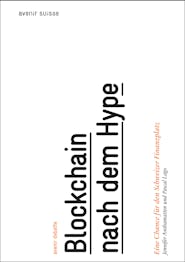The debate on digitization often revolves around the risks. The opportunities tend to get overlooked. But as Jennifer Anthamatten and Pascal Lago explain in the latest study from Avenir Suisse, digitization and DLT in particular are creating plenty of opportunity for the Swiss financial industry. The authors of the research see especially good potential in three areas:
- First, if it manages to position itself internationally as a pioneer in trading tokenized securities, Switzerland will be able to expand its relatively small capital market. The cost-savings resulting from the use of DLT as a kind of by-product also make the Swiss capital market generally more attractive for domestic and international issuers.
- Secondly, DLT can be profitably harnessed in trade finance, where transactions involve many different steps and parties. The new technology will make the relevant documents accessible to everyone concerned at all times, without a great deal of administrative work and expense.
- Thirdly, the technology will enable wealth managers to exploit new business models and client segments, for example in the safekeeping of the private keys required for access to any DLT system.
Useful groundwork has already been done in all these areas in Switzerland. But the time for pioneers is over: Switzerland now has to take the next step in the development of DLT, morphing from the much-vaunted “Crypto Valley” into a fully-fledged DLT nation.
The path to becoming a DLT nation
The Swiss financial industry needs an optimum framework to hold its own in the DLT arena. Basically, action is required in the following areas:
- Regulation: A major challenge will be to strike a balance between legal certainty and lean regulation. Essentially the law should be changed only in areas where it’s not yet DLT-compatible. But these changes have to be made as soon as possible. Regulation should be made technology-neutral. Wherever possible and reasonable, Finma should also be exploiting the potential of regtech more fully by making machine-readable regulation available.
- Public vs. private sector: It would facilitate tokenized securities trading if the National Bank and major players in the industry were to drive the development of a Swiss franc token. There’s also a serious need to modernize the interfaces between the public and private sectors, for example e-ID and the registry of deeds.
- International relations: The Swiss financial industry is traditionally very international. There’s also mounting global competition in the DLT arena. The employment market has to be kept open and attractive to people from abroad. This particularly applies for people from other countries graduating from Swiss universities, for which the quota is much too small at present.





